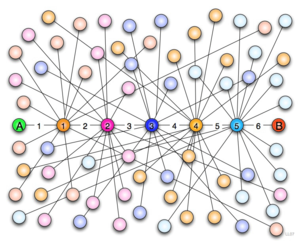 |
| Now 4.74 |
The world is even smaller than you thought.
Adding a new chapter to the research that cemented the phrase "six degrees of separation" into the language, scientists at Facebook and the University of Milan reported on Monday that the average number of acquaintances separating any two people in the world was not six but 4.74.
The original "six degrees" finding, published in 1967 by the psychologist Stanley Milgram, was drawn from 296 volunteers who were asked to send a message by postcard, through friends and then friends of friends, to a specific person in a Boston suburb.
The new research used a slightly bigger cohort: 721 million Facebook users, more than one-tenth of the world's population. The findings were posted on Facebook's site Monday night.
The experiment took one month. The researchers used a set of algorithms developed at the University of Milan to calculate the average distance between any two people by computing a vast number of sample paths among Facebook users. They found that the average number of links from one arbitrarily selected person to another was 4.74. In the United States, where more than half of people over 13 are on Facebook, it was just 4.37.
"When considering even the most distant Facebook user in the Siberian tundra or the Peruvian rain forest," the company wrote on its blog, "a friend of your friend probably knows a friend of their friend." The caveat there is "Facebook user" - like the Milgram study, the cohort was a self-selected group, in this case people with online access who use a particular Web site.
Though the study was by far the largest of its kind, it raised questions about definitions of terms like "friend" on Facebook.
A Microsoft study in 2008, using a more conservative definition of friend, found an average chain of 6.6 people in a group of 240 million who exchanged chat messages. Eric Horvitz, a Microsoft researcher who led the study in 2008, said that network was based on people who exchanged messages, rather than those who identified as "buddies."
"There is an issue of how many friends you actually have," he said. But, he said, the Internet might have altered the definition.
"My own notion of what a friend is has evolved," he said.
Jon Kleinberg, a computer science professor at Cornell and a faculty adviser to an author of the new study, said some links might be more meaningful than others.
He offered the example of a man wanted for a crime. A random Facebook user might discover that she took a class with someone who rented an apartment from someone who grew up with the suspect. They may all be connected as Facebook "friends."
"We are close, in a sense, to people who don't necessarily like us, sympathize with us or have anything in common with us," Dr. Kleinberg said. "It's the weak ties that make the world small." {Read On}

